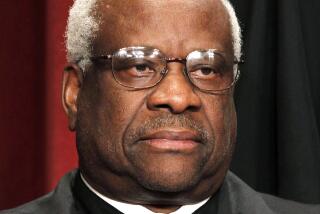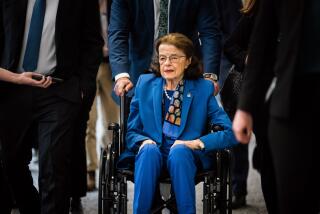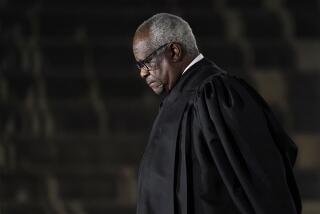Handling of Heiress’s Estate Is Questioned : Probate: Court investigator raises doubts about circumstances of Doris Duke’s death and ability of former butler to act as co-executor.
- Share via
NEW YORK — A report by a special court investigator sharply questions the circumstances of the death of tobacco heiress Doris Duke and the capability of her former butler to serve as co-executor of her $1.2-billion estate.
The report by Richard H. Kuh, unsealed Tuesday in Manhattan Surrogate’s Court, also questions the propriety of millions of dollars in payments and gifts--both before and after Duke’s death--to the former butler, Bernard Lafferty, and to her doctors and lawyers.
The lawyers alone have billed Duke’s estate for more than $13 million since she died Oct. 28, 1993 in her home above Beverly Hills, Kuh revealed. And Lafferty--who now has his own bodyguard and chauffeured Cadillac--has run up nearly $1 million in personal debts while suffering periodic drinking binges that could compromise his role as head of one of the nation’s largest charitable foundations, the investigator said.
“To say the court is astounded by many of these matters is to state the obvious,” said Manhattan Surrogate’s Court Judge Eve Preminger, who released Kuh’s report despite the objections of attorneys for Lafferty and the Duke estate, who complained that portions of the 64-page document were slanderous.
Preminger said she was deeply concerned by the findings of Kuh, a former Manhattan district attorney, and ordered a temporary halt to payment of legal fees by the Duke estate. The judge also indicated that she is considering removing Lafferty as co-executor of the estate along with the United States Trust Co. of New York.
The judge appointed Kuh on Jan. 20 to investigate “serious and sensational allegations” about Duke’s death and the subsequent handling of her Gilded Age fortune, most of which is slated to go to a new Doris Duke Charitable Foundation.
The most serious allegation came from one of Duke’s deathbed nurses, Tammy Payette, who claimed in an affidavit that the 80-year-old heiress did not die of natural causes, but was killed by a “massive sedation regime,” including large doses of morphine.
Payette’s credibility, however, suffered a blow March 31 when she was arrested on suspicion of stealing from wealthy patients. A separate inquiry into Duke’s death by the Los Angeles Police Department’s homicide unit sill has “a good couple of months work left,” Detective Rick Jackson said Tuesday.
*
In his report, Kuh said he considered himself a fact-finder and tried “not to be judgmental or to draw conclusions.” But he did not hesitate to raise critical questions about numerous events before and after Duke’s death, and disclosed that he hired a medical consultant to review Duke’s care.
The consultant, Dr. Nicholas T. Macris, concluded that the heiress was terminally ill after suffering a stroke in the summer of 1993. At the same time, he said, there was little evidence that she was in pain, but she nonetheless was given such large doses of morphine “that it would stop Ms. Duke’s breathing and cause her death.”
Although doctors said they did not want Duke to suffer and linger, Kuh speculated that her death may have been hastened--and handled in secrecy--to give her estate’s attorneys an advantage in an anticipated legal fight over her will. He also noted that her quick cremation prevented an autopsy.
But much of the report focuses on Lafferty, Duke’s ponytailed Irish-born butler, now 50, who was named chief executor in a will signed by the heiress in a Los Angeles hospital in April, 1993.
Kuh said Lafferty was, in fact, a devoted employee and that his relationship with Duke “appeared to be a loving one on the part of both, akin to a tender and devoted mother-son relationship.”
But Kuh raised questions about Lafferty’s lifestyle and ability to oversee such an estate.
Though the probate court has not yet approved Duke’s will--which provides for the former butler to get bequests of $500,000 a year plus millions more in executor fees--Lafferty “has made no visible effort to live within his means,” Kuh said. Instead, he has continued to live in Duke’s landmark mansions on both coasts, with personal servants, guards and “chauffeured transportation,” Kuh said.
At the same time, Lafferty has borrowed $825,000 from United States Trust and run up huge credit card bills at stores such as Giorgio Armani and Cartier, where he bought a second gold and diamond watch for almost $35,000, Kuh said.
The president of the huge New York bank approved the loans, Kuh said, on the rationale that while living with Duke, Lafferty had “acquired certain tastes”--and that he would be able to repay the bank when he finally got his money under the will.
But Kuh questioned whether there was a conflict of interest in the arrangement because Lafferty has the “power of life or death” over the bank’s role as a co-trustee of the estate--a job that stands to earn it $5 million in fees.
The investigator said Lafferty acknowledged suffering from alcoholism but that he had it mostly under control and was “generally able to function effectively within the parameters of his skills.”
Still, the former butler also has “gone on widely spaced alcohol binges,” including one as recently as December, Kuh said. The court-appointed investigator said a consulting psychiatrist advised him that “further episodes of alcohol abuse in the future are likely . . . and that Lafferty should not be managing complex financial matters for an appreciable time.”
Kuh said the estate in January bought a new Cadillac for Lafferty’s use on the rationale that as trustee of major foundations he “would have to travel in style when in California.” But Kuh said that except for driving Lafferty and bank personnel around, the only other use so far “has been to escort (actress) Victoria Principal, well-known and apparently involved in charitable enterprises, to (Falcon) Lair” (Duke’s Los Angeles mansion.)
Principal also is the wife of Duke’s plastic surgeon, Dr. Harry Glassman, who himself was the beneficiary of one of the payments questioned by the investigator.
Glassman received a $500,000 gift just three weeks before Duke’s death, Kuh said. About the same time, another Duke physician, Dr. Rolando Atiga, got a $900,000 loan and $1-million gifts were made with Duke funds to an Elizabeth Taylor AIDS foundation and the group People for the Ethical Treatment of Animals.
But the investigator said “no documentation establishes that these various gifts . . . were, in fact, approved by Duke,” who was in such poor condition that “she well may have been incapable of understandingly approving.”
*
During Tuesday’s court hearing, the chief attorney for the estate and Lafferty, Howard Weitzman, urged Judge Preminger to keep Kuh’s findings private.
“This report is somewhat one-sided in its interpretation,” Weitzman said. “There are opinions that are portrayed as slanderous.”
But Preminger repeatedly rejected Weitzman’s arguments, and at one point noted that “in view of the astonishing legal fees submitted . . . this motion (to seal the report) should not be made.”
After the hearing, Harland Braun, an attorney for Duke’s chief Beverly Hills physician--Dr. Charles Kivowitz--called “crazy . . . just bananas” the suggestion that Duke’s death may have been hastened to help stem off legal challenges to her will.
“I think that Mr. Kuh may be seeking to sensationalize his inquiry,” complained Stanley S. Arkin, who represents Dr. Glassman. The $500,000 check to the plastic surgeon “was a sincere gift to a good friend,” he said.
It was Glassman who recommended the large law firm--Katten Muchin & Zavis--that prepared Duke’s last will and now is representing her estate.
The firm, in turn, came in for some of the harshest analysis in Kuh’s report. He said just under $10 million in legal fees already have been paid by the Duke estate, including more than $9 million to that firm.
The investigator’s report was applauded Tuesday by lawyers for the chief challenger to Duke’s will, Dr. Harry B. Demopoulos, a former physician to the heiress who was named as her co-executor in an earlier will.
“Significantly, Kuh’s report is consistent with Dr. Demopoulos’ allegations that Miss Duke was the victim of undue influence,” attorney Suzelle M. Smith said.
More to Read
Sign up for Essential California
The most important California stories and recommendations in your inbox every morning.
You may occasionally receive promotional content from the Los Angeles Times.













